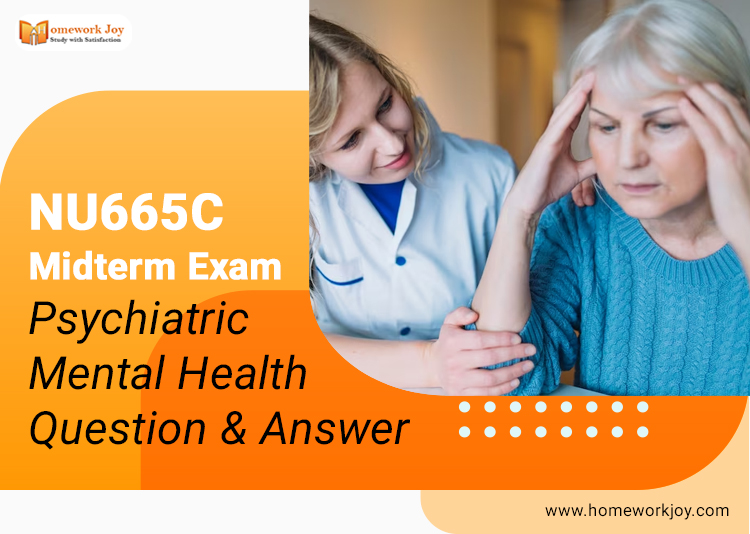The NU665C midterm exam on psychiatric mental health is such a crucial test for aspiring mental health professionals. With a comprehensive understanding of various psychiatric disorders, treatment options, and ethical considerations, students can ensure they’re prepared to make a difference in the lives of those struggling with mental health challenges. In this blog post, we’ll explore the questions and answers related to the NU665C midterm exam Psychiatric Mental Health Question & Answer
Table: NU665C Midterm Exam Psychiatric Mental Health Related Questions
| Question | Link |
| What is the difference between bipolar disorder and major depressive disorder? | Click Here |
| What is the role of the nurse in managing patients with schizophrenia? | Click Here |
| What are some common side effects of antipsychotic medications? | Click Here |
| What is the difference between generalized anxiety disorder and panic disorder? | Click Here |
| What is the role of the nurse in managing patients with substance use disorders? | Click Here |
Question 1: What is the difference between bipolar disorder and major depressive disorder?
Bipolar disorder is a mood disorder characterized by episodes of mania and depression, while major depressive disorder is a mood disorder characterized by persistent feelings of sadness or lack of enjoyment in daily activities. In bipolar disorder, the mood swings can be extreme, and the person may experience euphoria, high energy, and impulsivity during manic episodes. In major depressive disorder, the person may feel hopeless, have low energy, and have difficulty concentrating.
Question 2 What is the role of the nurse in managing patients with schizophrenia?
The nurse plays a crucial role in managing patients with schizophrenia. The nurse’s responsibilities include administering medications, monitoring for side effects, providing education to the patient and their family, and assisting with activities of daily living. The nurse should also promote a therapeutic environment, which involves providing a safe and comfortable space for the patient, being non-judgmental and empathetic, and promoting a sense of community.
Question 3: What are some common side effects of antipsychotic medications?
Antipsychotic medications are commonly used to treat schizophrenia and other psychotic disorders. Some common side effects include weight gain, drowsiness, dry mouth, blurred vision, and constipation. Few antipsychotic medications can also cause movement disorders, such as tardive dyskinesia, which involves involuntary movements of the face and limbs.
Some of these side effects can be barriers to antipsychotic medications and can negatively impact a patient’s quality of life. These barriers include the following:
1. Patients may feel discouraged or frustrated by the side effects and may be less willing to take their medication as prescribed.
2. Weight gain and other physical side effects can lead to decreased self-esteem and body image issues, which can affect a patient’s mental health and may lead to discontinuation of treatment.
3. Movement disorders such as tardive dyskinesia can be socially stigmatizing and may lead to embarrassment or isolation.
4. Drowsiness can affect a patient’s ability to function throughout the day, making it difficult to perform work or school-related tasks.
5. Dry mouth and constipation can be uncomfortable and may affect a patient’s overall quality of life.
Question 4: What is the difference between generalized anxiety disorder and panic disorder?
Generalized anxiety disorder is a chronic condition characterized by excessive worry and anxiety about everyday events, while panic disorder is a condition characterized by sudden episodes of intense fear or discomfort, often accompanied by physical symptoms such as rapid heartbeat, sweating, and shortness of breath. Generalized anxiety disorder typically involves persistent anxiety that is not related to specific triggers, while panic disorder involves sudden, intense episodes of anxiety that can be triggered by specific situations.
Question 5: What is the role of the nurse in managing patients with substance use disorders?
The nurse plays an important role in managing patients with substance use disorders. The nurse should provide education about the effects of substance abuse, assist with detoxification and withdrawal, and provide support during recovery. Additionally, the nurse should help with referrals to neighborhood services like support groups and rehabilitation plans.
Conclusion
The NU665C Midterm Exam in Psychiatric Mental Health can be challenging, but with the right preparation and knowledge, you can succeed. Remember to study the key concepts and theories, understand the role of the nurse in managing mental health patients, and review common medications and their side effects. Best of luck with your exam!
